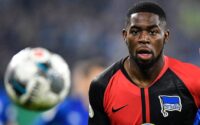The stench of David Beckham, Greg Norman profiting off Middle East money
Last month, Australian golf legend Greg Norman was officially named Chief Executive Officer of LIV Golf Investments. As CEO, the man known as the “Great White Shark” will oversee a new 10-event golf series on the Asian Tour, with the long-term aim of luring major players away from America’s PGA Tour.
Burning a hole in his pocket is $200 million of new funding from LIV’s principal investor, Saudi Arabia’s Public Investment Fund (PIF), a supposedly autonomous entity that is actually chaired by Crown Prince Mohammed bin Salman — the man linked to the execution of journalist Jamal Khashoggi at the Saudi Consulate in Turkey in 2018.
Norman, 66, seems weirdly relaxed about the man he’s getting into bed with (not that he would legally be allowed to do that in Saudi Arabia). He says his decision simply stems from a desire to grow the game in another part of the world, which is what sports stars always say when they’re asked to reconcile taking money from a regime with appalling human rights records. In January 2019, for example, Phil Mickelson, apparently one of golf’s stand-up guys, bagged a reported seven-figure appearance fee for flying halfway across the world to play in the Saudi International tournament, funded by bin Salman, insisting he was just “doing my bit to grow the game in the Kingdom.”
“I understand those who are upset or disappointed. You’ll be OK,” Mickelson told Twitter, in a flippant, unconvincing and, frankly, insulting defense.
When the magazine Golf Digest pressed Norman on Saudi Arabia’s treatment of women, he seemed unfazed by the country’s reputation. (According to the World Economic Forum’s Global Gender Gap Index, the Kingdom stands 147th out of 153 nations in the world.) Nor did he have concerns about where the financial backing was coming from. “The PIF, which is our majority investor, they’re obviously a commercial operation. They’re very autonomous,” he said.

And very wealthy. The Sovereign Wealth Fund Institute estimates that the PIF has $450 billion in assets and already boasts a wide range of shareholdings in publicly traded US companies like Disney, Uber, Bank of America and Boeing.
But the Saudi invasion of sport seems different, wrong even. It’s an ugly attempt to gloss over issues they want the world to ignore — a blatant backdoor bid for international acceptance. Call it cynical, distasteful or “sportswashing,” it still reeks.
Worryingly, though, nobody seems to care. In October, Mohammed bin Salman’s PIF completed the $400 million takeover of English Premier League soccer club Newcastle United, turning them from perennial underachievers to the richest team in the country overnight. Did their long-suffering supporters mind where their newfound prosperity came from? The fact that hundreds have been turning up at the team’s stadium waving Saudi Arabian flags and wearing keffiyeh suggests not. Several Premier League clubs, including Manchester United, did lodge protests against the sale, although reigning Premier League champions Manchester City, owned by the Abu Dhabi United Group, remained conspicuously tight-lipped.

Even UNICEF Ambassador David Beckham is following the Middle Eastern money trail. Next month, the English co-owner of Major League Soccer side Inter Miami CF will be unveiled as the face of the 2022 World Cup, hosted by Qatar, as part of a reported 10-year, $200 million deal he has signed to promote the country as a tourist destination. This, remember, is a nation where homosexuality is punishable by three years in jail and where rape victims can face imprisonment for having sex outside marriage. What’s more, Amnesty International estimates that more than 6,500 migrant workers, often paid less than a dollar an hour, died building the stadiums needed for the World Cup.
But hey, enjoy your vacation!
It’s hardly surprising. The simple fact that Qatar, a country smaller than the state of Connecticut with no real soccer heritage to speak of, should be awarded the sport’s most prestigious event amid ongoing investigations into bribery during the bidding process, tells you all you need to know.

Across the region, money is talking louder than protests ever could. In December 2019, an entirely new 15,000-capacity arena near Riyadh, Saudi Arabia, was built just so heavyweight boxers Anthony Joshua and Andy Ruiz Jr. could slug it out. Bahrain has routinely been “buying up” athletes from African nations like Ethiopia and Kenya to guarantee gold medals at major events. And next month will see the inaugural Saudi Arabian Formula One Grand Prix in Jeddah, an event that will cost the Kingdom nearly $700 million in hosting fees over the next 10 years.
Scratch the surface of most sports franchises or sponsorship deals and you’re bound to find something disagreeable. But the PIF’s pernicious deals are a lot more sinister.
Sadly, the world of sports — for all the joy it brings — still has an incurable habit of turning a blind eye to uncomfortable truths. With PIF’s vast wealth becoming increasingly influential, that won’t change any time soon.
Gavin Newsham is the co-founder of Golf Punk magazine and has also written for Golf Monthly and Golf World.


